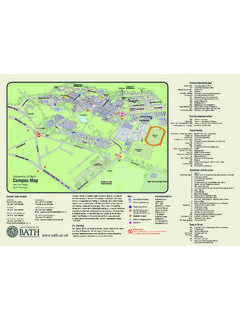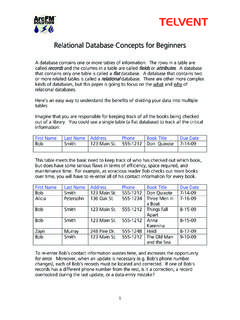Transcription of Discourses - Machiavelli
1 Discourses Upon The First Ten (Books) of Titus Livy To ZANOBI BUONDELMONTI AND TO COSIMO RUCELLAI By NICCOLO Machiavelli 1517 NICCOLO Machiavelli TO ZANOBI BUONDELMONTI AND TO COSIMO RUCELLAI 2 GREETINGS. I send you a present which if it is not equal to the obligations that I have toward you, it is one which without doubt the best that Niccolo Machiavelli has been able to offer you. Because in it I have expressed what I know and what I have learned through a long experience and a continuing study of the things of the world.
2 And neither you nor others being able to desire more of me, I have not offered you more. You may well complain of the poverty of my endeavor since these narrations of mine are poor, and of the fallacy of (my) judgment when I deceive myself in many parts of my discussion. Which being so, I do not know which of us should be less obligated to the other, either I to you who have forced me to write that which by myself I would not have written, or you to me that having written I have not satisfied you. Accept this, therefore, in that manner that all things are taken from friends, where always the intention of the sender is more than the quality of the thing that is sent.
3 And believe me I obtain satisfaction from this when I think that even if I should have been deceived on many occasions, I know I have not erred on this one in having selected you, to whom above all other of my friends I address (dedicate) these Discourses ; as much because in doing this it appears to me I have shown some gratitude for the benefits I have received, as well because it appears to me I have departed from the common usage of those writers, who usually (always) address (dedicate) their works to some Prince, and blinded by ambition and avarice laud him for all his virtuous qualities when they should be censuring him for all his shameful parts.
4 Whence I, so as not to incur this error, have selected, not those who are Princes, but those who by their infinite good qualities would merit to be such; (and) not to those who could load me with rank, honors, and riches, but to those who although unable to would want to do so. For men, when they want to judge rightly, should esteem those who are generous, not those who are able to be so; and likewise those who govern a Kingdom, not those who can but have not the knowledge. And writers lauded more Hiero of Syracuse when he was a private citizen than Perseus the Macedonian when he was King, for to Hiero nothing was lacking to be a Prince than the Principality, and the other did not possess any part of the King than the Kingdom.
5 Enjoy this, therefore, whether good or bad, that you yourselves have wanted; and if you should continue in this error that these thoughts of mine are acceptable, I shall not fail to continue the rest of the history according as I promised you in the beginning. Farewell. 3 Discourses OF NICCOLO Machiavelli ON THE FIRST TEN (BOOKS) OF TITUS LIVIUS TO ZANOBI BUONDELMONTI AND COSIMO RUCELLAI FIRST BOOK When I consider how much honor is attributed to antiquity, and how many times, not to mention many other examples, a fragment of an antique statue has been bought at a great price in order to have it near to one, honoring his house, being able to have it imitated by those who delight in those arts, and how they then strive with all industry to present them in all their work.
6 And when I see, on the other hand, the works of greatest virtu which Historians indicate have been accomplished by ancient Kingdoms and Republics, by Kings, Captains, Citizens, Lawgivers, and others who have worked themselves hard for their country, to be more readily admired than imitated, or rather so much neglected by everyone in every respect that no sign of that ancient virtu remains, I cannot otherwise than wonder and at the same time be sad: and so much more when I see in the civil differences that arise between Citizens, or in the maladies which men incur, they always have recourses to those judgments or to those remedies that have been judged or instituted by the ancients.
7 For the civil laws are nothing else but the decisions given by the ancient Jurisconsults, which reduced to a system presently teach our Jurisconsults to judge and also what is medicine if not the experience had by the ancient Doctors, (and) on which the present Doctors base their judgments? None the less in the instituting of Republics, in maintaining of States, in the governing of Kingdoms, in organizing an army and conducting a war, in (giving) judgment for Subjects, in expanding the Empire, there will not be found either Prince, or Republic, or Captain, or Citizen, who has recourse to the examples of the ancients.
8 Which I am persuaded arises not so much from the weakness to which the present education has brought the world, or from that evil which an ambitious indolence has created in many Christian Provinces and Cities, than from not having a real understanding of history, and from not drawing that (real) sense from its reading, or benefiting from the spirit which is contained in it. whence it arises that they who read take infinitely more pleasure in knowing the variety of incidents that are contained in them, without ever thinking of imitating them, believing the imitation not only difficult, but impossible: as if heaven, the sun, the elements, and men should have changed the order of their motions and power, from what they were anciently.
9 Wanting, therefore, to draw men from this error, I have judged it necessary to write upon all those books of Titus Livy which, because of the malignity of the times, have been prevented (from coming to us), in order that I might judge by comparing ancient and modern events what is necessary for their better understanding, so that those who may read these Discourses of mine may be able to derive that usefulness for which the understanding of History ought to be sought. And although this enterprise may be difficult, none the less, aided by those who have advised me to begin carrying this load, I believe I can carry it so that there will remain for others a short way to bring it to its destined place (end).
10 4 CHAPTER I WHAT HAVE GENERALLY BEEN THE BEGINNINGS OF SOME CITIES, AND WHAT WAS THAT OF ROME Those who read what the beginning of the City of Rome was, and of her Law-givers and how it was organized, do not wonder that so much virtu had been maintained for so many centuries in that City, and that afterward there should have been born that Empire to which that Republic was joined. And wanting first to discuss its birth, I say that all Cities are built either by men born in the place where they build it or by foreigners. The first case occurs when it appears to the inhabitants that they do not live securely when dispersed into many and small parties, each unable by himself both because of the location and the small number to resist attacks of those who should assault them, and they are not in time ((the enemy coming)) in waiting for their defense: or if they should be, they must abandon many of their refuges, and thus they would quickly become the prey of their enemies.










